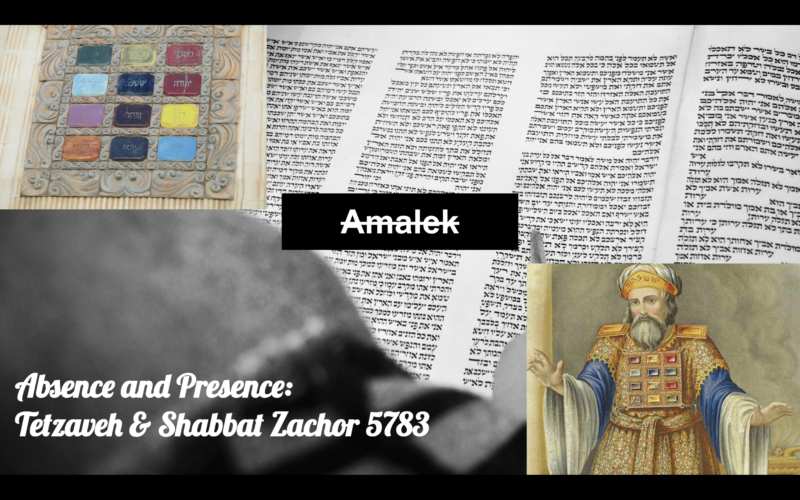
Absence and Presence: Tetzaveh and Shabbat Zachor 5783 / 2023
This week’s Torah portion, Tetzaveh, contains instructions from God about all kinds of sacrificial practices. Here are instructions on how to anoint Aaron and his sons as priests, how to make their special garments, and how to ordain them. There are instructions for daily offerings, and where to go to hear God’s voice (at the entrance to the Tent of Meeting, where community convenes.)
The Hasidic master known as the Kedushat Levi (aka R. Levi Yitzchak of Berditchev, 1740-1809) asks a question common to our sages: why is Moses not mentioned in this parsha? These instructions are given to Moshe, but his name never appears. It doesn’t even begin, “And God spoke to Moses, saying…” which is a pretty common frame in this part of Torah. What’s up with that?
And his answer is: in order to ordain Aaron and supervise everything in this parsha, Moshe has to serve as High Priest, a role that doesn’t exist yet because Aaron will be the first. Kedushat Levi says that when Moshe is filling this role, he engages in what our mystics call bittul. He lets go of ego and makes himself transparent to become a clear channel through which God can flow.
Moshe pours himself into service so thoroughly that he isn’t even named in this parsha… and he doesn’t need to be. His unnamed presence so profoundly suffuses this story that “he” doesn’t need to be “here” at all. We find Moshe in this Torah portion precisely in not-finding-him in this Torah portion. His name is absent, because his presence is so… present. It’s almost a kind of koan, isn’t it?
Here’s another: today is Shabbat Zachor, “the Shabbat of Memory.” There’s an extra Torah reading for today about how Amalek attacked us as we left Egypt. Amalek attacked from behind, targeting the weak, elders and children — so Torah instructs us to “blot out” that name. But how do we blot out a name by recounting it? If we’re naming Amalek, aren’t we thereby remembering?
Here’s my best understanding this year. Amalek’s name is in Torah. Our people’s spiritual history doesn’t get erased. Where we’ve come from and what we’ve been through are part of who we are. But we’re meant to X out this memory, to strikethrough, to repudiate the injustice and harm for which it stands. We remember Amalek even as we aspire not to be defined by traumatic memory.
The name Amalek has come to mean antisemitism personified: no longer a specific person or nation, but the hateful and age-old force of antisemitism itself. It implies all who hate us and want to destroy us. Like Haman — understood as Amalek’s descendant both physically and spiritually — which is why on Purim we gnash graggers to blot out that name. His name is spoken, and we also X it out.
Speaking of names (Moshe and Amalek, unspoken and spoken) — in Megillat Esther, God’s name never appears. Usually when The Name appears, we substitute Adonai or Hashem or some other word that points toward God’s ineffable un-sayable-ness. But in this scroll, it’s not that we replace The Name with anything — God’s name isn’t even there. A book of Tanakh without God?!
I mean, my answer is no, that’s not what this is. Yes, salvation from Haman’s plot to exterminate us appears to come entirely via human hands. But remember how R. Levi Yitzchak taught that in this week’s parsha Moshe is so present we don’t need to name him. I would argue that here God is the same way. God is everywhere in this story, so integral that it goes without saying.
And if divine presence is so woven into the Esther story that it goes without saying, then the same must be true for us in our moment now. Even if antisemitism is on the rise, even if modern life might sometimes feel the opposite of holy, God is not absent. Compassion, and justice, and love are not absent. They’re everywhere, if only we have eyes to see them… and hands to do them.
The Kedushat Levi also writes:
Each of us must wipe out that negative part that is called Amalek hidden in their heart… Since each of us is also a small world, when the power of evil in each of us arises (then) Amalek is still in the world.
For him, Amalek becomes an internal force — that within us which draws us to do the wrong thing, or keeps us from doing the right one. I love that Hasidic move of taking Torah inside, making it about our own hearts. And… we always need to balance the inner work with outward action. We are called to transform and reshape our inner Amalek so that we can act.
Mordechai reminds Esther, “If you don’t save our people, someone else will — but don’t imagine that your inaction will save you, and who knows, maybe this was the reason you became queen in the first place!” It’s Esther’s job to step up and save her people because she’s in a position to do it. Our sages call this divine providence: the hidden hand of God at work.
In a month we’ll read in the Passover haggadah that each of us is obligated to see ourselves as though we ourselves had been liberated from Egypt. What if each of us could also take on the obligation to see ourselves as if we were Esther? What if we’re planted in this place and time precisely so we can do something… and after Shabbes, what will our next action inspired by Esther’s bravery be?
This is R. Rachel’s d’var Torah from Shabbat morning services, cross-posted to Velveteen Rabbi.
Shared with gratitude to the Bayit board of directors for weekly learning together.





